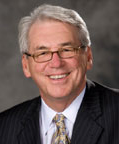By Mark Curriden, JD
Senior Writer for The Texas Lawbook
Recently retired federal Judge David Folsom, who presided over the $17.3 billion state tobacco litigation, has joined Jackson Walker as partner effectively immediately.
The Dallas-based law firm announced Wednesday that Folsom, who was the chief judge of the U.S. District Court for the Eastern District of Texas when he retired in March, will lead Jackson Walker’s new Texarkana office.

Appointed by President Clinton in 1995, Folsom served on the federal bench for 17 years. He handled scores of major IP cases, including the patent dispute between TiVo and Dish Network regarding television-recording devices. He conducted more than 250 trials.
In its press release, Jackson Walker says that its lawyers have appeared as counsel of record in more than 60 patent cases in the Eastern District during the past five years.
Lawyers who practiced before Folsom said he was the ideal judge because he allowed them to actually try their cases.
The biggest and most famous case over which Judge Folsom presided was the State of Texas v. American Tobacco Co. In 1996, then-Texas Attorney General Dan Morales filed a multibillion federal racketeering and fraud lawsuit against all the major cigarette makers, including Phillip Morris and RJ Reynolds. The state sought $15.3 billion for health care costs related to treating sick smokers.
A key moment in the case came when Judge Folsom decided to trifurcate the trial into three phases, with the racketeering claims to be heard first, other fraud-related claims second, and issues of causation last.
Weeks later, in January 1998, the case settled for $17.3 billion.
Efforts to reach Folsom through Jackson Walker officials were unsuccessful.
PLEASE NOTE: Content of The Texas Lawbook is controlled and protected by specific licensing agreements with our subscribers and under federal copyright laws. Any distribution of this content without the consent of The Texas Lawbook is prohibited.
